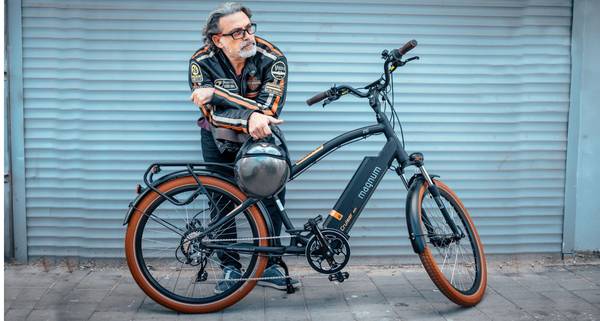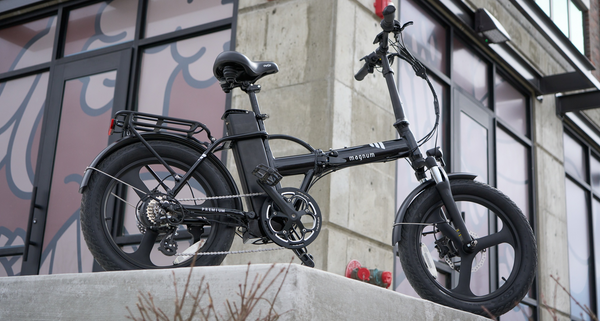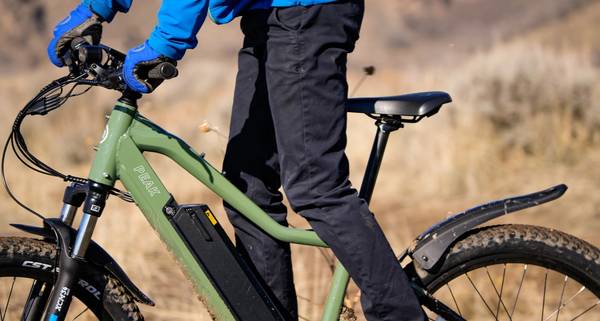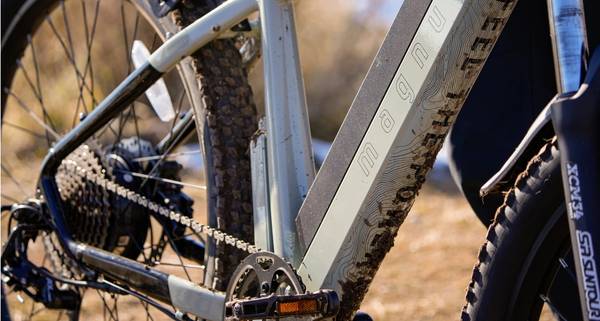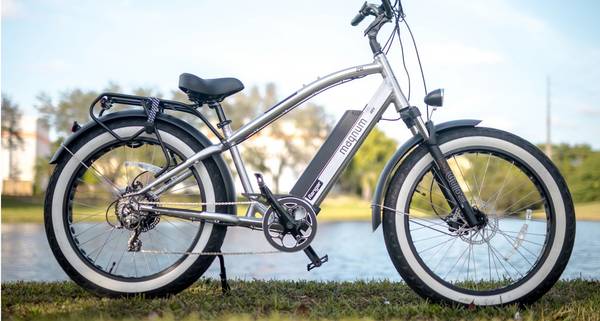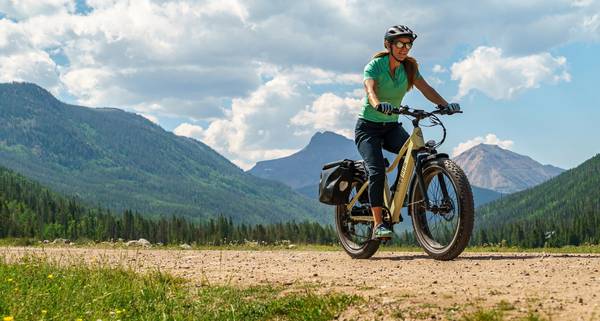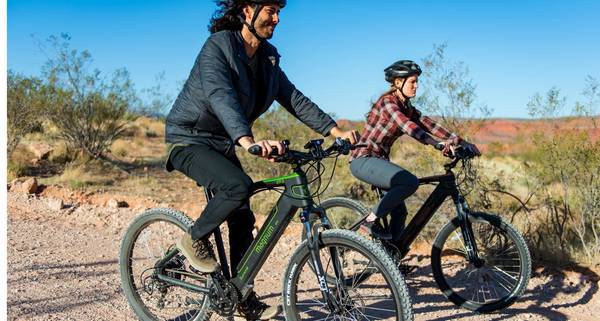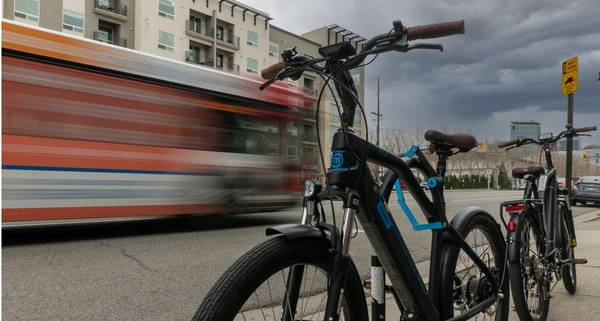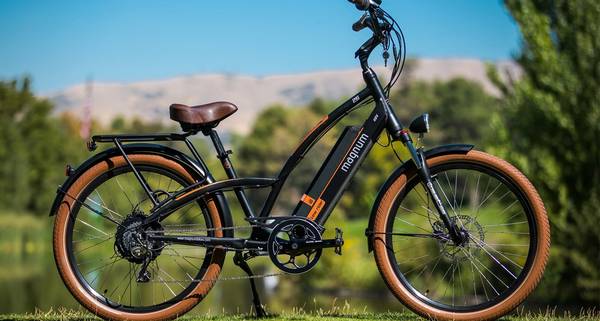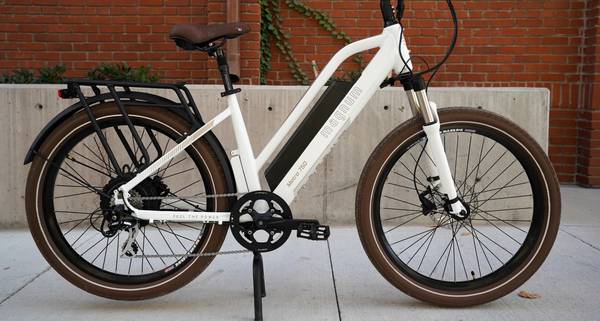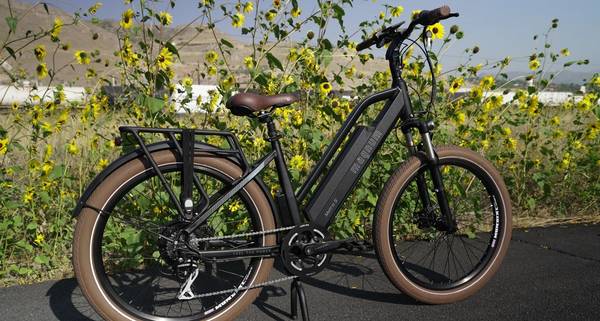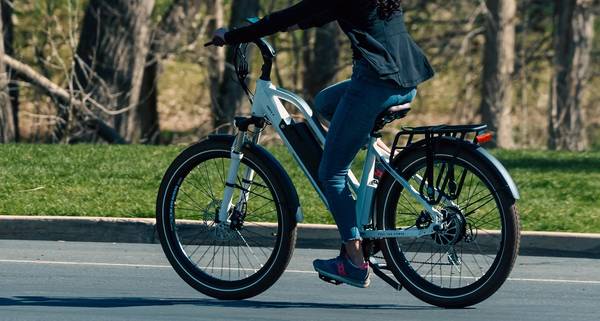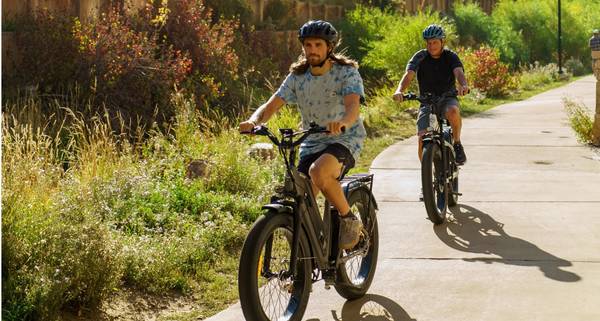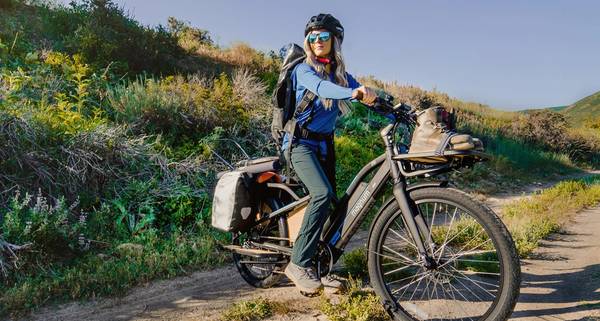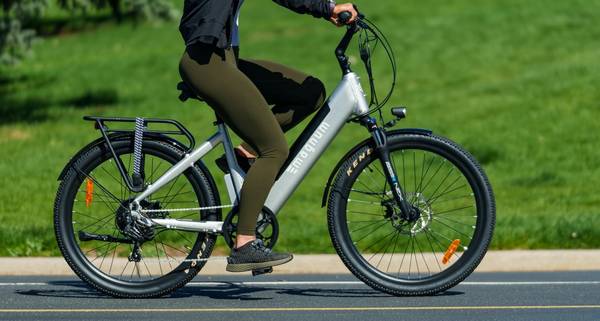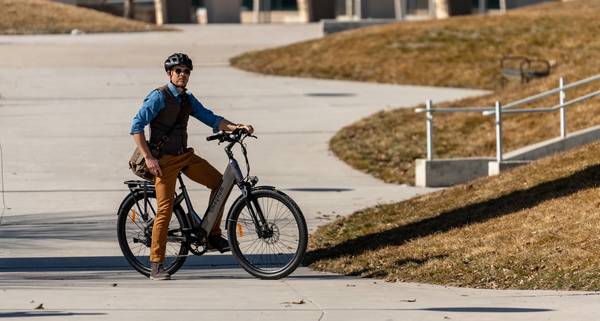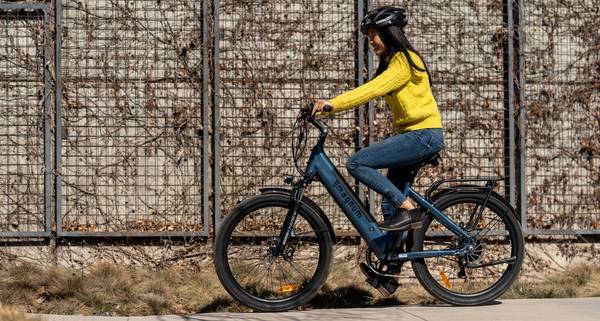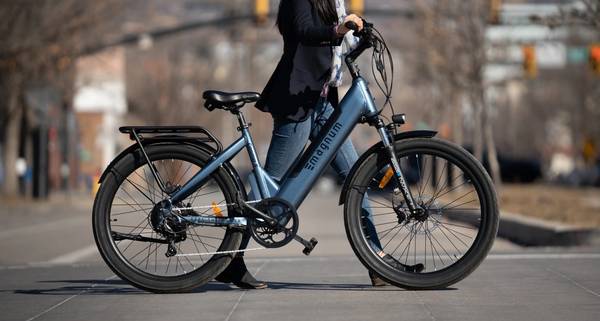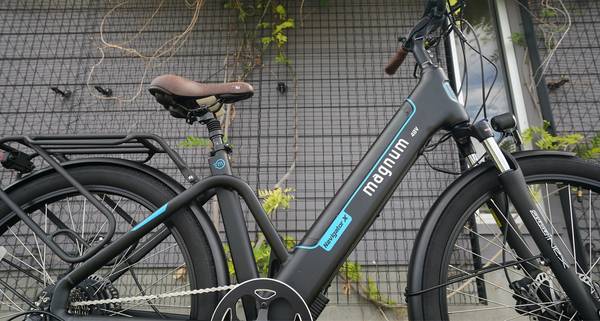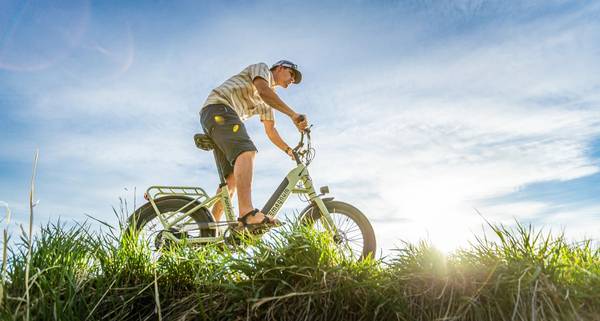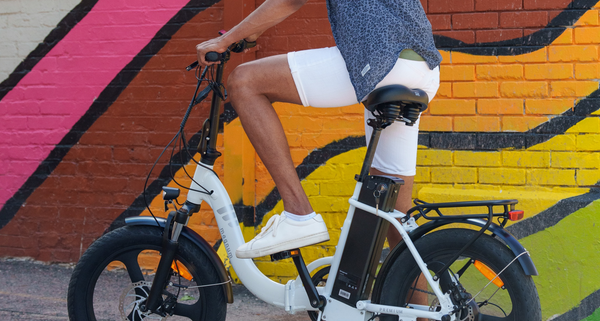How To Find Your Perfect E-Bike: A Complete Guide to Styles and Frame Shapes
When shopping for the best e-bike, selecting the right bike style and frame height are some of the most critical decisions you can make. Your comfort and performance depend on those choices.
This complete guide covers all you need to know, including choosing the right bike style for the way you love to ride, step height for your comfort, and frame size based on your body. By the end of this article, you’ll be confident about the best type of e-bike for you.
Looking for a specific section? Jump ahead:
E-Bike Styles
While they might switch things up now and then, riders usually spend the majority of their time in just one of the three main riding types:
- Relaxed cruising (mostly paved)
- Hybrid riding (casual city use, paved or trails)
- Workout (paved or trails)
E-bike frame shapes are typically designed with one of these specific riding styles in mind, impacting the bike’s construction. This means that how you’ll be using your e-bike is just as important as step style and standover height when deciding what e-bike to buy.
Cruisers For A Relaxed Ride
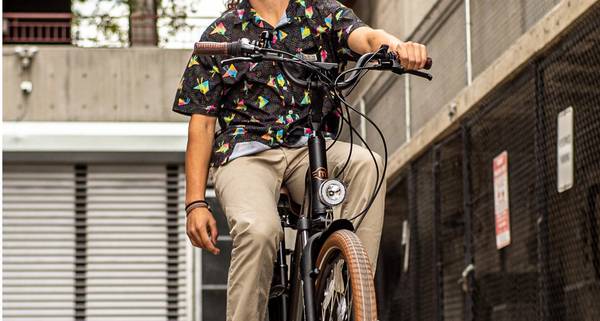
With a Cruiser, every ride is like a day at the beach. Pictured: Low Rider 1.0
When you think of someone cruising, you think of them as being relaxed, calm, and enjoying the ride. That’s exactly what cruisers deliver. They’re built for recreational use — riding in comfort. Cruiser bikes are sometimes also referred to as beach cruisers or comfort bikes. They feature a laid-back geometry where the pedals are placed forward of the seat post, as opposed to directly under the seat post.
Like riding on a cloud, cruisers feature a larger seat, with curved handlebars sitting higher than many other bike styles. This positioning lets the rider sit upright but relaxed, rolling along with low effort.
Since they’re designed to, well, cruise, most bikes in this style don’t feature a high number of gears or robust terrain-busting tires. So cruisers won’t be the best option if you’ll be riding over large hills or off-roading, or if speed is your top priority.
These bikes make the ideal choice for:
Beginners: Without extensive gear options or high learning curves, cruisers are a perfect choice for those new to biking or e-biking. They also tend to be budget-friendly compared to other frame styles.
Low-Mobility Riders: Especially when you choose a low-step model, cruisers are comfortable and low-impact — perfect for those recovering from injury or otherwise limited in movement. They are heavy, however, so if this describes you, don’t lift them on your own!
Flat Path Riders: Cruisers are very popular for coasting down boardwalks and other relatively flat, pedestrian-friendly paths. If you primarily need a comfortable way to get from Point A to Point B, a cruiser might be for you.
Hybrid Bikes For Dynamic City Living
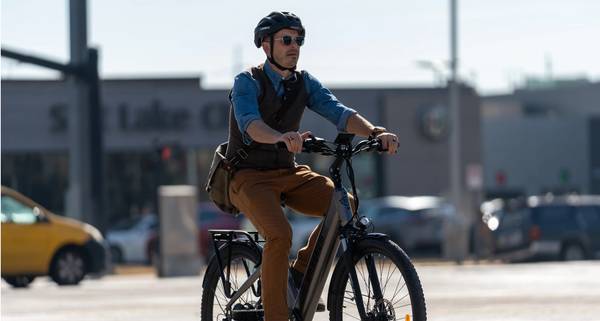
Hybrid bikes are for casual errands, slept-through-the-alarm mornings, and everywhere in between. Pictured: Cosmo+
Hybrid bikes combine the best features of mountain bikes and road bikes. They can conquer everything from city streets to parks and paved trails. Hybrids also typically have large 700c wheels with skinny, slick tires that roll fast on pavement — and can also handle the occasional light off-road excursion.
Features may include flat handlebars for responsive handling and front suspension for extra cushion in the urban jungle.
Due to the upright geometry of their frames, hybrid bikes are comfortable even for long rides. Much like a cruiser, the ergonomic positioning prevents riders from needing to hunch over to properly reach the handlebars. But unlike a cruiser, hybrids are built for increased responsiveness and speed.
Hybrids are well-loved by:
Commuters and Errand-Runners: Offering performance advantages over cruisers and more comfort than racing bikes, hybrids are great for the everyday commuter.
Frequent Riders: Anyone who rides regularly will love hybrids for the same reasons that commuters do!
Exercise Enthusiasts: Hybrids let you get a great workout with some speed to show for it, and are a more comfortable exercise option compared to racing bikes.
Aerodynamic Bikes For Uncompromised Speed
Whether for mountain bike or road bike competitions, these bikes are designed for speed, efficiency, and aerodynamics. To achieve this, the frame shape places the rider angled more toward the ground, rather than upright. This positioning lets riders put more power into the pedals and helps with aerodynamics.
Be aware that this aggressive posture can feel unnatural or even cause injury for riders that aren’t accustomed to riding in that style. Racers who make the switch to this more extreme riding position should make gradual adjustments as they build up their flexibility.
These bikes are the right choice for:
Competitive Cyclists: Since these bikes come with ergonomic challenges, you probably need a good reason to really want one. Competition is one of those reasons.
Speed-Demon Riders: You don’t have to be a competitive cyclist to want a fast bike, but you should have an appreciation for their power and speed! Don’t let that sleek, streamlined frame design go to waste.
While most anyone can choose a cruiser or hybrid bike if they so choose, there are riders who should definitely avoid this style of bike. In particular, riders with low mobility will have a tough time getting comfortable on a bike with racing geometry because it requires a flexible back and hips. Know your limits.
Bike Frame Shapes
Whether cruiser, hybrid, or another frame shape, almost all modern bikes can fall into one of three categories of frame shapes:
- High-step
- Mid-step
- Low-step/step-through
The classification is based on how high a rider needs to lift their leg and foot up and over the bike frame in order to straddle the bike.
The high bar or tube in the middle of the bike is called the top tube. As you might expect, in a high-step frame (sometimes called a “step-over” or “sloping top tube”), the top tube is high up, around crotch level. But on a low-step or step-through frame, there may be no top tube at all, meaning riders only need to lift their foot a few inches off the ground to clear the frame.
Let’s get a closer look at each of these frame types.
High-Step Frames
High-step frames, sometimes known as sloping top tube frames or step-over frames, are a hallmark of the modern road bike, developed in the late 20th century. At that time, the top tube sat high and fully horizontal, connecting the seat post to the handlebar stem. That recognizable shape is still popular with track bikes and fixed-gear bikes (also known as fixies).
But newer high-step road bikes typically angle the top tube slightly downward (not nearly as much as a mid-step frame). Still, the top tube typically stands 28” or more above the ground, depending on the frame size.
When a rider is standing next to or straddling the frame, the top tube should reach their mid-thigh. This means that swinging your leg over the frame to mount the bike requires considerable flexibility and mobility.
The sturdy construction of a high-step bike’s triangle-shaped frame efficiently transfers your pedal power into speed. Triangles are among the strongest shapes in engineering, connecting the frame at multiple junctures. This structure also leads to better weight distribution: it puts the rider’s center of gravity in a more natural position, for better handling.
Bike frames without this shape (step-through and mid-step frames) tend to absorb more of the pedaling power, requiring more exertion to achieve the same speed.
Sloping top tube frames are a great choice for:
Riders Who Race: The balanced weight distribution and increased stability of this frame shape offers numerous advantages for fast-paced rides.
Distance Riders and Long Commutes: Mounting and dismounting is more of an effort on step-over bikes compared to other frame styles, but this isn’t a problem on extended training rides and lengthy commutes.
Recreational Riders Who Crave Speed and Stability: The sturdy construction of a high-step frame gives you more speed and better balance with less effort, meaning your fun weekend rides are only as challenging as you want them to be.
Magnum high-step e-bikes include:
Mid-Step Frames
A mid-step frame is characterized by a steeply angled top tube. While riders do need to lift their leg up and over (much more so than a step-through frame), the angle requires less effort than a high-step frame. The top tube height of mid-step frames normally ranges between 20” to 28”.
This newer frame configuration marries the frame strength of a high-step frame with the convenience of a step-through frame. More on that convenience in the step-through section!
Mid-step frames combine advantages of both step-over and step-through frames, making them well suited for:
Riders Who Prioritize Performance and Comfort: Mid-step frames offer comparable stability to sloping top tube frames with the comfort and ease of use of a step-through.
Casual Riders: Mid-step frames aren’t built for racing, but they pack a bigger punch than a cruiser. Everyday commuters or paved trail riders will love the balanced features of a mid-step.
Magnum mid-step e-bikes include:
Low-Step Or Step-Through Frames
On the low-step or step-through frame, the top tube is either very low or nonexistent. That means that out of all the frame types, this one requires the lowest effort to straddle the bike and start riding.
The step-through frame was developed in the late 1800s. It was designed to accommodate the constricting, ankle-length dresses that women wore in keeping with the fashion and gender norms of the era. But as society and fashion evolved, the step-through frame stayed relevant for its convenience and style.
Today, the step-through design is a gender-neutral frame shape that benefits a variety of riders:
Riders Who Make Frequent Stops: Step-through frames are convenient for anyone who needs to hop on and off their bike frequently during a ride. This might include bike couriers, commuters, riders running errands, students on campus, or sightseers.
Riders With Shorter Legs: The dip in a low-step frame lets shorter riders get on and off their bike without catching their foot on a high top tube.
Riders With Mobility Challenges: Step-through bikes are particularly helpful for cyclists with mobility limitations in their hips or legs, which may make it difficult to mount and dismount taller-framed bikes.
Riders Recovering From Injury: Navigating a high-step frame when in recovery from a knee, leg, back, or another injury can be painful. Step-through frames reduce this barrier to getting back on your bike.
Magnum step-through e-bikes include:
Understanding Standover Height And Bike Fit
Why are frame size and fit important? They impact your comfort and ease of mounting and dismounting, but they're also a factor in rider safety. In case of a sudden stop, you need to be able to quickly and easily dismount your bike.
You may not realize it, but if you’ve ever ridden a bike, you’ve already checked the standover height! When mounting a bike, the first thing you do is swing one leg over the bike and stand over the top tube, straddling the frame. The vertical distance between the ground and that point on the top tube right is called the standover height.
It’s important that the standover height is smaller than your leg inseam — but not too small. There should be a small gap (at least 1”) between your crotch and the frame, but you shouldn’t be towering over the top tube, either.
There are other ways your bike needs to properly fit you, but once you determine the right standover height, the other elements can be adjusted. You can customize saddle height, handlebar reach and positioning, and more on most bikes to get an ergonomic ride. Check your bike manual for details on how to make those adjustments.
Get Up Close And Personal With Your New E-Bike
You’ve picked your step height and your riding style; now you’re ready to ride! If you haven’t visited your local Magnum shop or authorized dealer yet, it’s the best way to learn even more about your needs and preferences. Talk to the experts, get in the saddle, and take a few e-bikes for a spin! When you find the perfect e-bike, it just might be love at first ride.


